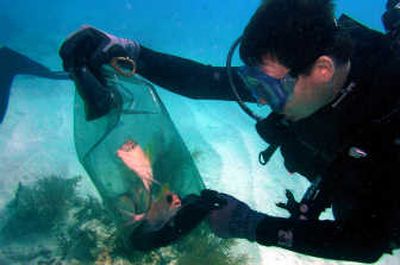New Orleans aquarium hooked by FEMA rules

NEW ORLEANS – In what some see as another bureaucratic absurdity after Hurricane Katrina, FEMA is refusing to pick up the cost of restocking New Orleans’ aquarium because of how the new fish were obtained: straight from the sea.
FEMA would have been willing to pay more than $600,000 for the fish if they had been bought from commercial suppliers. But the agency is balking because the Audubon Aquarium of the Americas went out and replaced the dead fish the old-fashioned way, with hooks and nets. That expedition saved the taxpayers a half-million dollars but did not comply with FEMA regulations.
“You get to the point where the red tape has so overwhelmed the process that there’s not a lot you can do to actually be effective,” Warren Eller, associate director of the Stephenson Disaster Management Institute at Louisiana State University, said of FEMA’s actions.
Katrina knocked out power to the tourist attraction at the edge of the French Quarter in August 2005, and the staff returned days four days later to find sharks, tropical fish, jellyfish and thousands of other creatures dead in their tanks.
Aquarium officials wanted to reopen the place quickly. So even before the $616,000 commitment from the Federal Emergency Management Agency came through, they sent a team on an expedition to the Gulf of Mexico, the Florida Keys and Bahamas, where they caught 1,681 fish for $99,766.
Despite the clear savings, the dispute has dragged on for 17 months.
“FEMA does not consider it reasonable when an applicant takes excursions to collect specimens,” FEMA quality control manager Barb Schweda wrote in a 2006 e-mail. “They must be obtained through a reputable sources where, again, the item is commercially available.”
FEMA’s refusal to reimburse the aquarium is grounded in the Stafford Act, the federal law governing disaster aid that has been criticized as inadequate for Katrina recovery. The Stafford Act says facilities can only be returned to their pre-disaster condition, not improved. Under those rules, the aquarium would have to buy fish of the approximate age and size of the lost specimens.
State experts and others counter that acquiring thousands of duplicates in the marketplace is nearly impossible and a waste of public money.
“You can go out in the commercial market and buy a clownfish. You can also go out and capture it. And if you’re capturing fish to fill an aquarium, it is much more cost-effective. Talk about being good stewards of the taxpayer dollar,” said Rick Patterson, a specialist with James Lee Witt Associates, a firm that mediates Louisiana’s disputes with FEMA. The firm is led by Witt, FEMA director during the Clinton administration.